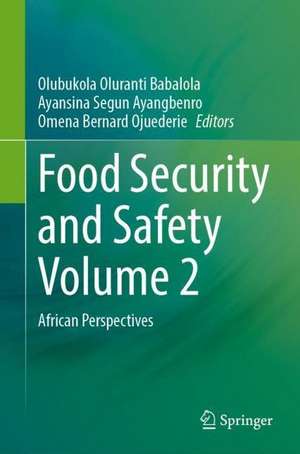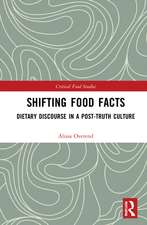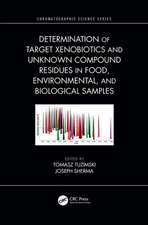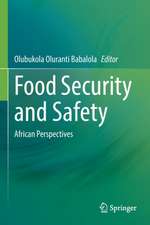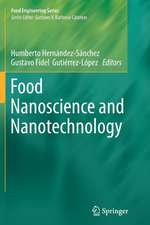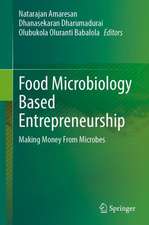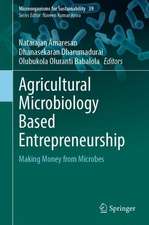Food Security and Safety Volume 2: African Perspectives
Editat de Olubukola Oluranti Babalola, Ayansina Segun Ayangbenro, Omena Bernard Ojuederieen Limba Engleză Hardback – 17 noi 2022
| Toate formatele și edițiile | Preț | Express |
|---|---|---|
| Paperback (1) | 1390.73 lei 43-57 zile | |
| Springer International Publishing – 18 noi 2023 | 1390.73 lei 43-57 zile | |
| Hardback (1) | 1396.89 lei 43-57 zile | |
| Springer International Publishing – 17 noi 2022 | 1396.89 lei 43-57 zile |
Preț: 1396.89 lei
Preț vechi: 1703.52 lei
-18% Nou
Puncte Express: 2095
Preț estimativ în valută:
267.30€ • 279.78$ • 222.47£
267.30€ • 279.78$ • 222.47£
Carte tipărită la comandă
Livrare economică 31 martie-14 aprilie
Preluare comenzi: 021 569.72.76
Specificații
ISBN-13: 9783031096136
ISBN-10: 3031096134
Pagini: 483
Ilustrații: XXXVI, 483 p. 74 illus., 66 illus. in color.
Dimensiuni: 155 x 235 mm
Greutate: 0.9 kg
Ediția:1st ed. 2023
Editura: Springer International Publishing
Colecția Springer
Locul publicării:Cham, Switzerland
ISBN-10: 3031096134
Pagini: 483
Ilustrații: XXXVI, 483 p. 74 illus., 66 illus. in color.
Dimensiuni: 155 x 235 mm
Greutate: 0.9 kg
Ediția:1st ed. 2023
Editura: Springer International Publishing
Colecția Springer
Locul publicării:Cham, Switzerland
Cuprins
1-The potential of resistant starch type 1 for nutritional food security.- 2-Evaluation of bioaccumulation of heavy metals in some fish species from the rice farms’ channels of Pouss (Far-North, Cameroon).- 3-Evaluation of the levels of nine heavy metals in five crops using AAS and XRF.- 4-The role of food in the health management of geriatrics.- 5-Genetically modified crops: perspectives and safety concerns in Africa.- 6-Indigenous leafy vegetables and health management in South Western Nigeria: A review based on Osun State.- 7-Combined application of subsurface drainage and fertilization, a method to reduce the effects of iron and sulfide toxicities in irrigated rice fields in Burkina Faso.- 8-Is food medicine? Lessons from a household survey on plants used to manage anaemia in Kilifi County, Kenya.- 9-Plantain bioactives: An underutilised food resource in Africa.- 10-New perspectives in the utilization of African leafy vegetables.- 11-The uptake of farming technological innovationsfor food security in Kejom Ketinguh of the North West region of Cameroon. A contribution to anthropology of food production.- 12-Food and nutrition insecurity in Africa: The primary drivers and sustainable strategies to improve the current status.- 13-Marker-assisted selection (MAS): Untapped potential for enhancing food and nutrition securities in Sub Saharan Africa.- 14-Harnessing the opportunities for sustainable small-scale rural farming towards attaining food security in Southern Africa.- 15-Improving food security in Africa through sustainable utilization of selected climate smart emerging crops: A case of Botswana and Namibia.- 16-Essentials of nutraceuticals and probiotics.- 17-Phenotypic characterisation of nine accessions of okra.- 18-Long-term restorative farming effects on soil biological properties for carbon stock, soil quality and yield in a Nigerian northern guinea savanna alfisols.- 19-Climate change: impact on food security for health management and its adaptation strategies for sustainability among households in Southeast, Nigeria.- 20-Climate change, growth in agriculture value added, food availability and economic growth nexus in the Gambia: A Granger causality and ARDL modeling approach.- 21-Adoption of genomics and breeding strategies to improve goat productivity in Southern Africa.
Notă biografică
Professor Olubukola Oluranti BABALOLA Pr.Sci.Nat., MASSAF, FASLP, FTWAS, FAS, the Vice President of OWSD, is an NRF rated scientist with over 20 years of research experience focusing on rhizosphere metagenomics, coupled with an MBA in General Management. She has consistently advocated using biofertilizers over & above chemical fertilizers for plant health management. Her effort for SDG 2 “Zero Hunger” in the continent of Africa for food security & sustainable agriculture is helping farmers, women, & all food lovers. She is the incumbent Research Director of the Food Security & Safety Focus Area at NWU. Her laboratory attracts students from worldwide. Olubukola is a member of the editorial board for Applied and Environmental Microbiology (American Society for Microbiology, USA), BMC Microbiology (Elsevier), and Biochemistry & Biophysics Reports (Elsevier). She has received many awards, including being the finalist, GenderInSite 2020. She is passionate about capacity building &has graduated 26 doctoral fellows, 24 masters, and numerous Honors students. Olubukola is a prolific author with about 300 publications. Her most recent Springer edited book is entitled “Food Security and Safety: Africa’s Perspective.” She is an AAAS-TWAS Science diplomacy alumnus, impacting the world after the eye-opening awareness of policymaking, diplomacy, and diplomatic engagement. She is now taking action using the gender lens and forging collaborations with diplomats. She is a fellow of The World Academy of Sciences (TWAS), the Academy of Science of South Africa (ASSAF), and the Nigerian Academy of Science (NAS). Her wealth of international experience spans the universe. She enjoys international collaborations, research grants, and many awards.
Dr. Ayansina Segun Ayangbenro is a postdoctoral fellow at North-West University, South Africa. He obtained his Bachelor’s and Master’s degree from the Federal University of Agriculture, Abeokuta, Nigeria and his PhD from North-West University. He is a recipient of NRF/TWAS 2016 Doctoral fellowship Award. His research interests include the ecology of soil microorganism and recycling of nutrients, and plant-microbe interactions. Ayansina has authored and co-authored many peer-reviewed journal articles published in reputable national and international journals. He is a member of the South African Council for Natural Scientific Professions and the Society for Applied Microbiology.
Dr. Omena Bernard Ojuederie is a seasoned researcher and academic with plant genetics and biotechnology expertise. His research focuses on biodiversity assessment and phylogenetic studies of underutilized crops, plant tissue culture, molecular biology, plant-microbe interactions, and improving food security in Africa. He is a member of the Editorial Board of the Journal of Underutilized Legumes and a grantee of the International Foundation for Science (IFS) Sweden. He was a postdoctoral research fellow and currentlyan Extraordinary Senior Lecturer of the Food Security and Safety Focus Area, North-West University, South Africa. In addition, he is a Senior Lecturer in the Biotechnology Unit of the Department of Biological Sciences, Kings University, Nigeria, where he also serves as the Acting. Director of Research and Linkages and Acting Director of Academic Planning and Quality Assurance.
Dr. Ayansina Segun Ayangbenro is a postdoctoral fellow at North-West University, South Africa. He obtained his Bachelor’s and Master’s degree from the Federal University of Agriculture, Abeokuta, Nigeria and his PhD from North-West University. He is a recipient of NRF/TWAS 2016 Doctoral fellowship Award. His research interests include the ecology of soil microorganism and recycling of nutrients, and plant-microbe interactions. Ayansina has authored and co-authored many peer-reviewed journal articles published in reputable national and international journals. He is a member of the South African Council for Natural Scientific Professions and the Society for Applied Microbiology.
Dr. Omena Bernard Ojuederie is a seasoned researcher and academic with plant genetics and biotechnology expertise. His research focuses on biodiversity assessment and phylogenetic studies of underutilized crops, plant tissue culture, molecular biology, plant-microbe interactions, and improving food security in Africa. He is a member of the Editorial Board of the Journal of Underutilized Legumes and a grantee of the International Foundation for Science (IFS) Sweden. He was a postdoctoral research fellow and currentlyan Extraordinary Senior Lecturer of the Food Security and Safety Focus Area, North-West University, South Africa. In addition, he is a Senior Lecturer in the Biotechnology Unit of the Department of Biological Sciences, Kings University, Nigeria, where he also serves as the Acting. Director of Research and Linkages and Acting Director of Academic Planning and Quality Assurance.
Textul de pe ultima copertă
Sustainable food production is a global challenge with respect to climate change and an ever-increasing world population. Conventional crop production using agrochemicals presents human health and environmental challenges. Rising concerns about environmental sustainability have increased attention toward improved, efficient, and sustainable means of crop production. Various strategies are employed in enhancing crop production to adapt and mitigate climate change and ensure food security. The future of food production relies on improving productivity without compromising long-term productivity and environmental sustainability. Feeding the ever-increasing world population would require concerted efforts by all stakeholders to combat the impact of climate change and numerous ecological challenges facing food production. Hence, innovative technologies and methods are indispensable in mitigating the effects on food security. The book looks at the current challenges and solutions, from an African perspective, regarding food safety and health management, food security and nutrition, climate change and sustainable food production, and forest resources and food security. The target audience is scientists, graduate students, researchers, academicians, and professionals in food production for sustainable development and ecosystem management. This book will also be helpful to policymakers and specialists in framing future feasible agro-ecosystem policies.
Caracteristici
In-depth on how Africa can be self-sufficient in food production using locally available resources Views on how climate change is changing the dynamics of food security and safety in Africa Evaluation of food security and safety concerns in Africa
